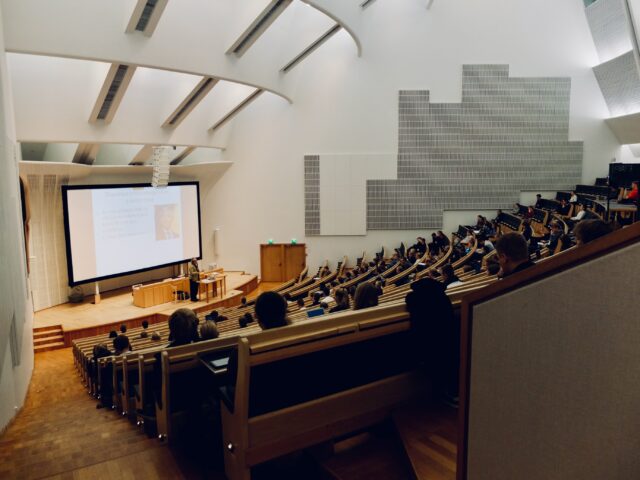In Western Canada, students and staff alike are discussing the potential impact of the recent student permit cap on postsecondary education. The provincial governments of Alberta, British Columbia, Manitoba, and Saskatchewan are waiting for more information on the cap and the specific provincial impacts it will have. The Calgary Herald suggests that the distribution of study permits could benefit AB, which currently sports a lower proportion of international students; CBC reports that SK could have a similar outcome. Meanwhile, Global News reports that BC does not intend to hike tuition for domestic students to offset losses from the cap. Royal Roads University President Philip Steenkamp noted that the federal policy risks communicating that “we’re not open for business,” and said that institutions will need to be proactive in communicating that international students are welcome.

Top Ten News
January 26, 2024
Several members of Ontario’s university system say that the recent international student policy changes could have serious implications for what is already a financially strained sector. UWaterloo Spokesperson Rebecca Elming told CBC that the university is concerned about the “implications of this decision at the undergraduate level.” Council of Ontario Universities CEO Steve Orsini noted to City News that many universities are already in perilous financial situations. City News reports that tuition cuts and freezes have pushed institutions to be more reliant on international tuition. “We think a more refined, targeted approach would be better policy and not impact the good performers that rely on that funding or revenue from international students to operate,” said Orsini.
Saint Mary’s University will close its English-language training centre this May, reports CBC. The Language Centre has been in operation for more than 25 years, helping students who are conditionally accepted to SMU to develop their English skills. SMU spokesperson Margaret Murphy said that the decision to close the centre was driven by decreasing demand for its services. “The demand for ESL training at SMU had already waned prior to COVID and COVID exacerbated that trend,” stated Murphy. She added that many students have increasingly sought out private-sector providers for their English-language training. CBC reports that this closure comes in the wake of other measures that SMU has enacted to shore up financial security, including implementing a hiring freeze, not filling vacancies, and cutting down on travel and hospitality.
The University College of the North and the University of Manitoba Faculty of Law will soon offer a Pre-Law program so that Indigenous and northern students can prepare to enter law school. This programming was designed in partnership with representatives of UManitoba’s Faculty of Law, the Northern Bar Association, the Law Society of Manitoba, and Legal Aid Manitoba, as well as Provincial Court Judge Todd Rambow. The programming equips students with the competencies needed to begin law school; includes enhanced advising, student counselling, mentorships, and coaching supports; and prepares students for the Law School Admission Test. “Providing students with opportunities to complete Pre-Law in northern Manitoba will help address shortages in the legal profession in the north,” said UCN President Doug Lauvstad.
Wilfrid Laurier University is collaborating with Rongo University on a seven-year program that provides food production training to farmers in Migori, Kenya. The program addresses gaps in the food production chain by disseminating information and amplifying farmers’ voices using local media. The project aims to enhance training for graduate fellows in a variety of fields and give them opportunities to share knowledge with local communities. “We will ensure that the project is participatory to help bring voices together and share knowledge collectively to address poverty, food insecurity, and climate change in the county,” said WLU Assistant Professor Dr Andrew Spring.
Alberta international students and students’ associations are calling on the federal government to permanently lift its cap on work hours. Last year, Canada announced that it would reinstate its cap on the number of hours a week that international students can work and CBC reports that several Alberta students’ associations and unions have responded by calling for the cap to be permanently removed. Alberta Students’ Executive Council Chair Celia Sutton argued that allowing international students to take on more work hours supports their success and financial empowerment.
Brock University has unveiled a new name and facility for its inclusive training centre. The Brock Functional Inclusive Training (Bfit) Centre opened this week at the Walker Sports and Abilities Centre. The Bfit Centre is a state-of-the-art facility equipped with modern equipment and ample space for the supervised community exercise programs. It provides a welcoming and accessible environment for seniors and people experiencing a variety of health conditions as they practice physical activities with guidance from professional kinesiologists and Brock students. “The intergenerational aspect of Bfit’s programs benefits both our members and students,” said Bfit Centre Director Deborah O’Leary.
An international student from Memorial University has created an artificial intelligence (AI) powered app to support international student learning. Collins Chukwuma designed an app that allows students to take pictures of problems or ask questions in order to receive guidance on a variety of issues. The app personalizes the learning experience and helps students quickly find the information they need, using machine learning to learn more about user preferences. Chukwuma said he built the app to help get himself through school, but a viral video about it has since spread the word. “After getting very positive feedback, I realized that if this could help a few of us, maybe it could help many others,” said Chukwuma.
2024 has been dubbed the “year of elections,” given that within the next twelve months, countries home to approximately half of the world’s population will hold elections. An article in Inside Higher Ed breaks down how postsecondary issues might factor into election campaigns and voter decisions around the world this year. The article discusses upcoming election trends within India, Indonesia, Mexico, Pakistan, South Africa, Taiwan, the United Kingdom, the United States, and the European Union. While postsecondary issues may not be the foremost factor driving voters, the authors state that certain topics–especially international student visa policies, public funding for universities, and academic freedom–could become hot-button debates on the campaign trail.
The University of Niagara Falls Canada has joined the growing list of postsecondary institutions that have signed the United Nations (UN) Sustainable Development Goals Accord (SDG Accord). In so doing, UNFC has committed to help deliver on the SDGs, report annually on their progress, and share any learnings with other institutions around the world. “The SDG Accord is a platform for action and by signing it, [UNFC] is acknowledging our commitment to the wellbeing of our students, staff, and community,” said UNFC Provost David Gray. “We’re aware of the challenges facing the world and [UNFC] is willing to take action to be part of the solution.”
